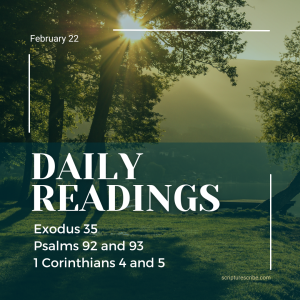
7 days ago
Thoughts on the bible Readings 1 Samuel 1, Isaiah 46, 47, Revelation 3, 4 for June 22nd
Samuel, as well as being Israel's last judge, was the bridge between the 450 year era of the judges and the kingdom of God on earth in its first constitution. From the lofty heights of Ramathaim-Zophim came a devout Levite named Elkanah, who has two wives Hannah and Peninnah - the former being barren, but greatly loved. Hannah was sorely grieved and provoked by her adversary Peninnah. Together Elkanah and Hannah went to the Tabernacle at Shiloh to entreat God for a son. In her extreme grief Eli, the High Priest, mistakenly thinks she is a drunken loose woman and implores her to leave. She pours out to him her heart, just as she has done to God, and he asks that Yahweh would grant her the petition she made. Samuel is born, prepared and educated at home for a life of service to the LORD. At the appropriate time he is presented at the house of worship and returned to God.
Isaiah 46 outlines the utter futility of idols, which had to be rescued and rushed away from the battle at Babylon's fall. Verses 3-4 tell of Yahweh being Israel's nursing Father who from the time of the nation's birth until their old age. He is the Redeemer of Israel and will save them with an everlasting salvation in Messiah's kingdom. Verses 5-7 describe the mindset of idol worshippers and the futility that comes with their exertions to make a beautiful idol. Verses 8-11 tell of the Almighty judging of all idolators and the foreknowledge and power of our Omnipotent Creator who knows everything that will happen and reveals the important truths about His people through His prophets: Amos 3verses 1-8. The man destined to conquer Babylon and execute the LORD's judgement s was Cyrus king of Persia. Cyrus Is likened to a bird of prey ravening the carcass of degenerate Babylon. Contrast this with our Omniscient Creator who tells the future, even predicting the overthrowing of Babylon about 200 years after this prophecy by Isaiah concerning Cyrus, whose method of capturing the impregnable city of Babylon is described. That he would also decree for the exiles from Jerusalem to return - see Ezra 1 verses 1-4; which occurred in BC 537. A coin commemorating this and the relocation of the US Embassy to Jerusalem was issued in 2017 with the quote from Ezra.Isaiah 47 is a chapter of Zion's rejoicing at the humiliation of Babylon. That majestic harlot sits in the dust to eke out an existence and she does so because as verse 4 says: "Yahweh has redeemed Zion". The two women of this chapter are the two women of Proverbs and the two women of Revelation. Verses 5-9 outline the haughty thoughts of literal Babylon and they are symbolic of the thinking of mystical Babylon. The words are quoted in Revelation 18:7. Verses 10-13 tell of her lying enchantments and sorceries which are commented on in Revelation 18 verses 11-24. Isaiah 47 verses 14-15 speaks of Babylon's being brought to nought.
Revelation 3 is our Lord's timeless message of warning, advice and essential attitudinal changes were required of the 3 of the 7 Turkish ecclesias Sardis, Philadelphia and Laodicea. The first had to realise that the reputation Sardis once enjoyed was gone and they needed to wake up, repent and get back to their roots. Philadelphia, alone of the ecclesias received no condemnation, but rather they are encouraged to remain steadfast. On the other hand, the wealthy Laodicea was pitifully ignorant of their true state and needed to open the door of their hearts to the soon to be returned and door-knocking Lord Jesus Christ. Chapter 4 presents the Christ ruling with his saints in glory. The chapter is an invitation for the Lamb, the Lord Jesus Christ, to ascend into the political heavens through the open door and rule upon the earth. This is an encouraging vision of the kingdom on which we will elaborate on in tomorrows' comments. Chapter 4 presents the Christ ruling with his saints in glory. It is part of a vision of the Lord Jesus Christ ruling in glory with his saints - faithful believers - during the kingdom age soon to come. The Apostle John as part of the Lords bride is invited into the political heavens of rulership at the start of this vision. The first part of this vision is revealed in chapter 4 verses 2-11. John sees the throne of the Lamb surrounded by 24 elders who represent the worthy saints of all time until the resurrection. They are the 24 orders of king-priests that reign with Jesus Messiah. These 24 elders are described in verse 7 as being like the cherubim of Ezekiel 1 and the seraphim of Isaiah 6. In verses 8-11 they rightfully ascribe glory to God and His glorious Son.
No comments yet. Be the first to say something!